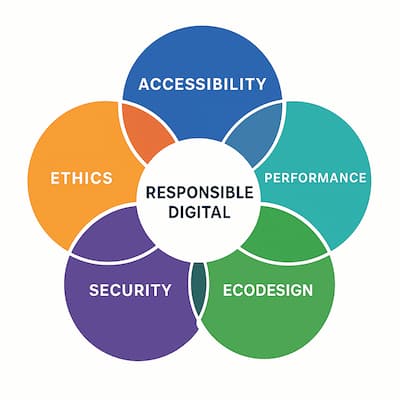For a responsible digital world #
What is responsible digital and why does it matter?
Responsible digital refers to a set of practices for designing, developing, and maintaining digital services that are more efficient, accessible, secure, and resilient. It relies on concrete technical levers: reducing data transfers, front-end optimization, limiting third-party dependencies, eco-design of interfaces, efficient infrastructure, and strengthened security (encryption, permissions, data protection). It’s a holistic quality approach: improving performance, maintainability, security, and accessibility while reducing the service’s environmental footprint.

A responsible web: lean and efficient #
I strive to optimize every project I work on: fewer dependencies, fewer requests, better cache management, and faster load times—even on slow connections.
- Web performance optimization for all usage contexts
- Focus on the right web performance metrics (CWV, TTFB, LCP…)
- Elimination of unnecessary dependencies (CSS, JS, back-end…)
- Continuous improvement through measurement and iteration
How does responsible digital make the web more ethical?
Responsible digital aims to design more inclusive, efficient, and accessible web services. By reducing technical requirements — page weight, unnecessary scripts, third-party dependencies — we make websites usable by everyone, regardless of their device or connection quality.
A responsible web: accessible and inclusive #
I strive to make my projects accessible to everyone, regardless of usage, physical or cognitive abilities, or assistive technologies used.
- Compliance with RGAA and WCAG best practices
- Keyboard navigation and screen reader support
- Contrast, HTML semantics, ARIA
Why is accessibility essential in responsible digital practices?
Accessibility is a core requirement of any responsible digital service. It ensures equal access to content and functionality, supports regulatory compliance, and promotes inclusion at every level—technical, ethical, and societal.
Safe, ethical and high-quality digital practices #
I make it a point of honor to embed security and quality from the very first lines of code. Transparency and integrity guide my technical and interpersonal choices alike.
- GDPR compliance, OWASP best practices
- Clean code, documentation, testing and code reviews
- Ethical approach and user respect
How is security part of responsible digital practices?
Security is a core element of responsible digital practices. Protecting personal data, ensuring system integrity, and avoiding deceptive techniques are all ethical decisions. A trustworthy digital service is a secure one.
Teaching, mentoring, training #
I regularly lead training sessions, raise awareness, and support other teams. Sharing my knowledge is a way to amplify the impact of responsible digital practices.
- Professional training within companies
- Individual or group mentoring
- Contributions to public guides and standards
Why such a strong focus on pedagogy?
A more ethical digital world won't emerge without actively sharing best practices. Pedagogy is a powerful driver of change.
A more responsible digital world is possible.
It starts with clear, bold, and grounded choices.